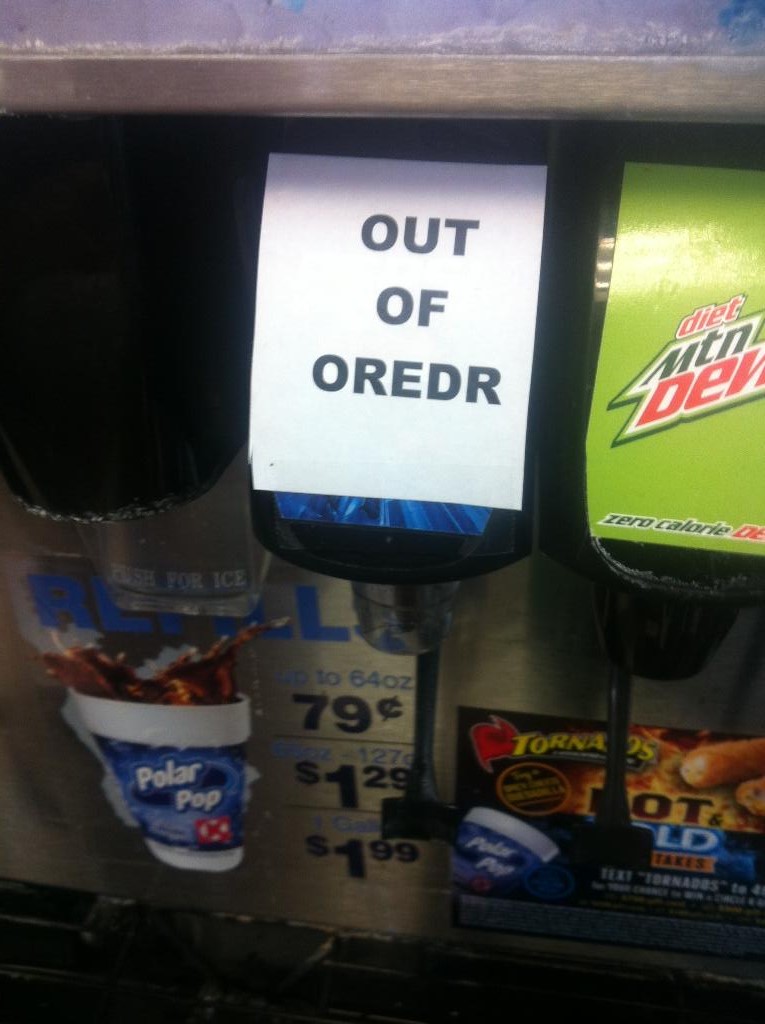A friend sent this one to me. I’ve heard this term use in a derogatory manner, but I have never seen it used to sell headwear.

A friend sent this one to me. I’ve heard this term use in a derogatory manner, but I have never seen it used to sell headwear.

My granddaughter found this sign at a Circle K. I hope it was inattention and not classic stupidity that caused this error. But it would only take two seconds to make it right. What a difference that two seconds would make. Take the time to make sure your work is accurate!


Copyright: pixelsaway / 123RF Stock Photo
When your son’s baseball team scores a run, what do you say? Yeah, yea, or yay?
Hopefully yay is the correct answer to the first question. Is the opposite also true?
Any of these are correct informal replacements for no but none of them is as fun as yay! Let’s make it a point to notice something worthy of a big “YAY!” today!
Once again, an apostrophe refresher: it’s is a contraction and means IT IS and its is the possessive form of it so means belonging to it (or in this case belonging to Baseball Tonight) . . . which is what this advertisement is REALLY trying to say.

My apologies for the error in today’s post “Try and Get This Right So We Can Try to Learn Something,” and thanks to the eagle eyes who caught it. The error has been fixed so if you received the post by email, please go to the revised link. I will endeavor to draft posts earlier in the evening while my brain isn’t concentrating on how many hours of sleep it will get if we go to bed now! Thanks, as always, for your support!
The error has been fixed so if you received the post by email, please go to the revised link. I will endeavor to draft posts earlier in the evening while my brain isn’t concentrating on how many hours of sleep it will get if we go to bed now! Thanks, as always, for your support!
Thinking about Thanksgiving here in the United States got me thinking about names of holidays and grammar rules. For instance, if you use Eve or Day with the name of a holiday, i.e., Thanksgiving Day, you capitalize day. However, if you were to say “the day before Thanksgiving,” day would not be capitalized. Religious holidays are also capitalized
Even some “invented” holidays are capitalized
Is happy capitalized when used with a holiday? If you exclaim “Happy Thanksgiving!” then it is, but if you use it in a regular sentence “I wish you all a happy Thanksgiving,” then it is not.
Generally, the seasons of the year are not capitalized unless it is part of a proper name.
When using seasons to describe time of year, remember that seasons are reversed in the Northern and Southern Hemispheres. When it is summer in the U.S., it is winter in most of South America and Australia. In that case, it is clearer to say “the first three months of the year,” or “the last quarter of 2014.”
As for possessives with the word “season,” the phrase Season’s greetings! is possessive because you are referring to holidays that happen only during one season—winter. Possessives with names of holidays are usually singular; however, where the holiday is plural, the apostrophe is after the plural word:
The official holiday name wins out over plurals and possessives, so you may just have to look it up to be positive you are correct.
I wish you all a happy Thanksgiving and know that when I count my blessings, the people who read my blog faithfully, those who stumble across it, and those who cheer me on are near the top of my list. Thank you!
A friend recently forwarded me a question about the first sentence in a brief for a state Court of Appeals that they wanted to make sure was correct. The sentence was (which I have changed to protect her client):
There is nothing specifically on point in the Gregg Reference Manual, but I did find a couple of places on the Internet where the question was answered with the example of “M.D.” In that case, for singular possession, you add “s” after the apostrophe, i.e., Jim Jones, M.D.’s diagnosis. The most prevalent use of what would be “Jim Jones, Esq.’s” is on LinkedIn–certainly not an expert in the grammar area–but makes the most sense and follows the example for M.D. I think the proper sentence would be:
The easiest answer is to reword the sentence:
OR
It was a great question and something that at first blush seems simple, but when you really think about it, it wasn’t quite so easy.